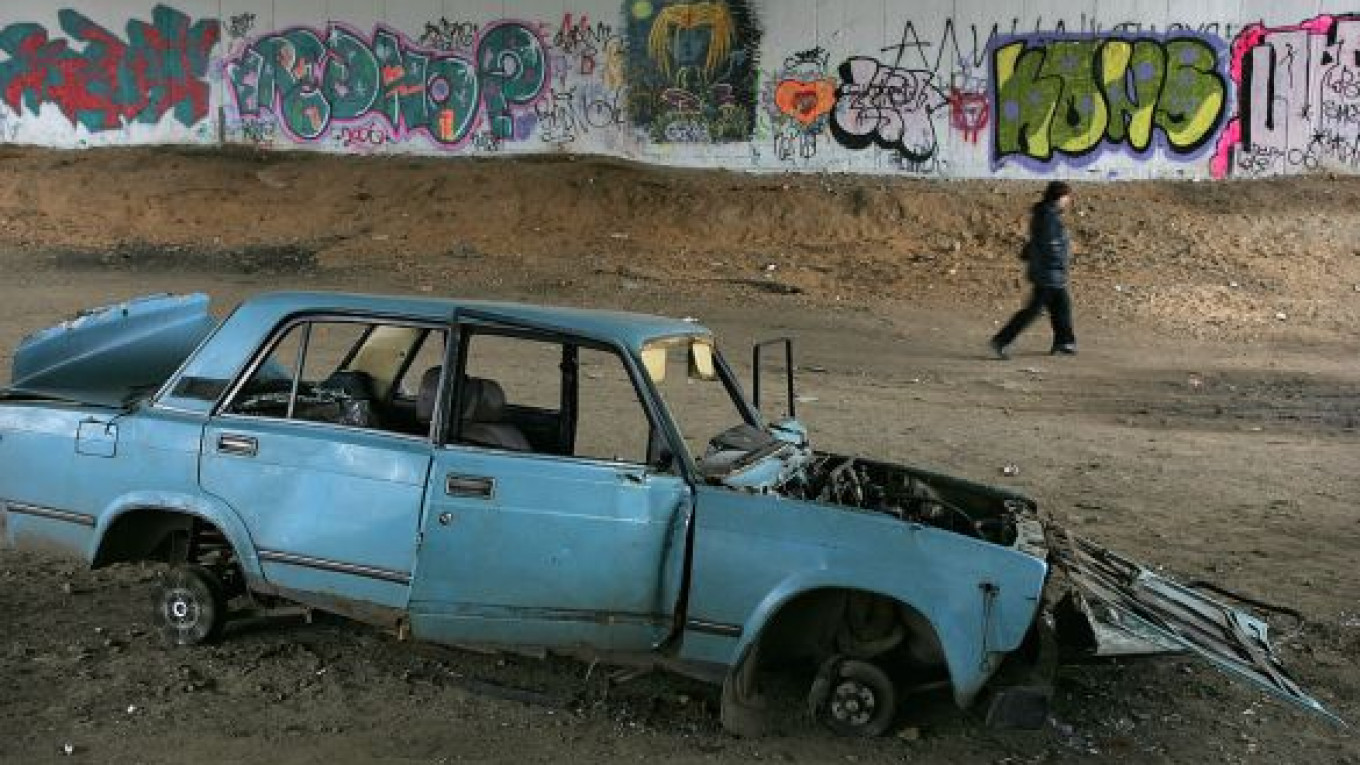The Industry and Trade Ministry wants to stimulate new car purchases by raising the transportation tax for vehicles that do not meet Euro 4 emissions standards — in some cases even doubling the rate, Vedomosti has learned.
The ministry sent a proposal to the Finance Ministry that would link the transportation tax to a car's emissions standard starting in 2011.
Each emissions standard would be assigned a coefficient that would either reduce or increase the base rate of the transportation tax, Deputy Industry and Trade Minister Andrei Dementyev wrote in the plan, a copy of which was obtained by Vedomosti.
Owners of vehicles that comply with the Euro 4 standard would see the tax unchanged from the base level of 2.5 rubles to 15 rubles (8 cents to 49 cents) per horsepower, depending on the engine's power. Euro 3 compliant vehicles would have the rate raised 20 percent, while Euro 2 cars would face an increase of 60 percent.
Cars that are Euro 5 compliant or higher would get a 30 percent discount on the base rate, the proposal said. For vehicles made before Jan. 1, 2006 — before Russia introduced Euro 2 emissions standards — the base rate would be doubled.
Russia introduced the Euro 2 standard in 2006 and two years later moved to Euro 3. Starting this year, new cars must meet the Euro 4 emissions standard, which has been mandatory in Europe since 2005 to reduce vehicle pollution.
The different rates are meant to encourage Russians to purchase cars that meet higher environmental standards, Dementyev wrote in the plan. Regional governments would retain the right to increase the base rate — by up to tenfold — or reduce it, in part or in full, for vehicles with less than 150-horsepower engines.
Sergei Belyakov, director of the Economic Development Ministry's investment policy department, said he supported the proposal and suggested linking it to other measures to support the auto industry. Companies need to be encouraged to produce environmentally friendly cars if consumers are going to be urged to buy them, he said.
The Finance Ministry proposed allowing regional governments to set the coefficients, Deputy Finance Minister Sergei Shatalov wrote in an official response to the proposal, a copy of which was obtained by Vedomosti.
"It's simply out of control. Officials promised to cancel the transportation tax in exchange for higher excise taxes on gasoline, but instead they're basically proposing double taxation of car owners," said Vyacheslav Lysakov, head of the drivers' rights group Svoboda Vybora. He said more than half the cars in Russia are more than five years old.
According to Avtostat, only 28 percent of cars and light trucks in Russia have been in use for less than five years. The percentage is just 2.6 percent in the Far East, while in Siberia it is 12.2 percent. The figure ranges from 25 percent to 35 percent elsewhere in Russia.
Since emissions standards were introduced in 2006, every vehicle's documentation comes with a special "environmental class" listing, an Industry and Trade Ministry official said. The listing is not required for cars purchased before 2006, and since these cars essentially do not belong to any of the emissions classes, they should face the highest tax rate, the official said.
Owners of such cars would be able to have them certified in a special garage that would approve the vehicles for one of the standards, allowing the driver to reduce the tax rate, he said.
The majority of new cars imported into Russia are Euro 4 compliant, and foreign carmakers producing cars in Russia primarily meet the standard as well, said Vladimir Vidulov, a spokesman for auto industry researcher JATO Dynamics. Euro 4 was used as the base level in many European countries, he said.
"It's the right decision, which will spark Russians to get rid of junk cars," Vidulov said. "It won't lead to a serious hike in prices for cars, since technology now makes it possible to cheaply mass-produce modern catalytic converters."
While not a bad idea, introducing the different tax levels could lead to a social uprising, considering the average age of cars on Russia's roads, said Andrei Dya, commercial director of major car dealer Avtomir Group. Switching to Euro 4 is also problematic because of the quality of gasoline available in Russia, he said.
Lysakov, of the drivers group, said that about 45 percent of gasoline in Russia does not meet any emissions standards.
The proposal is still under discussion, said Dmitry Peskov, Prime Minister Vladimir Putin's press secretary. Any decision will take into account the state of the Russian auto industry and the higher tax burden on car owners, he said.
A Message from The Moscow Times:
Dear readers,
We are facing unprecedented challenges. Russia's Prosecutor General's Office has designated The Moscow Times as an "undesirable" organization, criminalizing our work and putting our staff at risk of prosecution. This follows our earlier unjust labeling as a "foreign agent."
These actions are direct attempts to silence independent journalism in Russia. The authorities claim our work "discredits the decisions of the Russian leadership." We see things differently: we strive to provide accurate, unbiased reporting on Russia.
We, the journalists of The Moscow Times, refuse to be silenced. But to continue our work, we need your help.
Your support, no matter how small, makes a world of difference. If you can, please support us monthly starting from just $2. It's quick to set up, and every contribution makes a significant impact.
By supporting The Moscow Times, you're defending open, independent journalism in the face of repression. Thank you for standing with us.
Remind me later.






